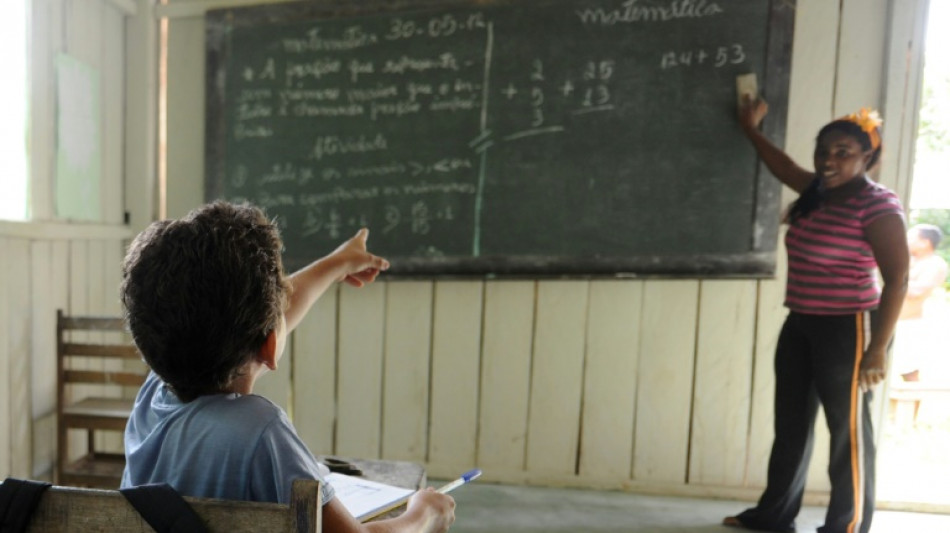
-
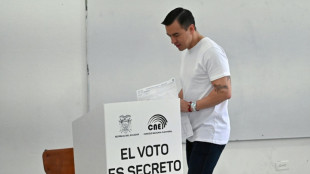 Ecuador votes on reforms as Noboa eyes anti-crime ramp-up
Ecuador votes on reforms as Noboa eyes anti-crime ramp-up
-
Chileans vote in elections dominated by crime, immigration

-
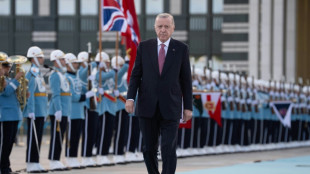 Turkey seeks to host next COP as co-presidency plans falter
Turkey seeks to host next COP as co-presidency plans falter
-
Bezzecchi claims Valencia MotoGP victory in season-ender

-
 Wasim leads as Pakistan dismiss Sri Lanka for 211 in third ODI
Wasim leads as Pakistan dismiss Sri Lanka for 211 in third ODI
-
Serbia avoiding 'confiscation' of Russian shares in oil firm NIS
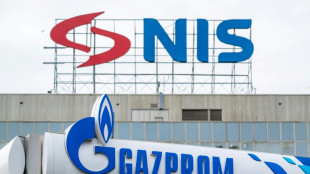
-
 Coach Gambhir questions 'technique and temperament' of Indian batters
Coach Gambhir questions 'technique and temperament' of Indian batters
-
Braathen wins Levi slalom for first Brazilian World Cup victory

-
 Rory McIlroy wins seventh Race to Dubai title
Rory McIlroy wins seventh Race to Dubai title
-
Samsung plans $310 bn investment to power AI expansion
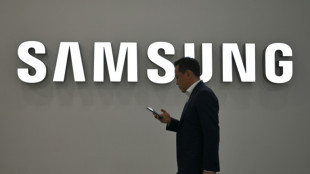
-
 Harmer stars as South Africa stun India in low-scoring Test
Harmer stars as South Africa stun India in low-scoring Test
-
Mitchell ton steers New Zealand to seven-run win in first Windies ODI

-
 Harmer stars as South Africa bowl out India for 93 to win Test
Harmer stars as South Africa bowl out India for 93 to win Test
-
China authorities approve arrest of ex-abbot of Shaolin Temple

-
 Clashes erupt in Mexico City anti-crime protests, injuring 120
Clashes erupt in Mexico City anti-crime protests, injuring 120
-
India, without Gill, 10-2 at lunch chasing 124 to beat S.Africa

-
 Bavuma fifty makes India chase 124 in first Test
Bavuma fifty makes India chase 124 in first Test
-
Mitchell ton lifts New Zealand to 269-7 in first Windies ODI

-
 Ex-abbot of China's Shaolin Temple arrested for embezzlement
Ex-abbot of China's Shaolin Temple arrested for embezzlement
-
Doncic scores 41 to propel Lakers to NBA win over Bucks

-
 Colombia beats New Zealand 2-1 in friendly clash
Colombia beats New Zealand 2-1 in friendly clash
-
France's Aymoz wins Skate America men's gold as Tomono falters

-
 Gambling ads target Indonesian Meta users despite ban
Gambling ads target Indonesian Meta users despite ban
-
Joe Root: England great chases elusive century in Australia

-
 England's Archer in 'happy place', Wood 'full of energy' ahead of Ashes
England's Archer in 'happy place', Wood 'full of energy' ahead of Ashes
-
Luxury houses eye India, but barriers remain

-
 Budget coffee start-up leaves bitter taste in Berlin
Budget coffee start-up leaves bitter taste in Berlin
-
Reyna, Balogun on target for USA in 2-1 win over Paraguay

-
 Japa's Miura and Kihara capture Skate America pairs gold
Japa's Miura and Kihara capture Skate America pairs gold
-
Who can qualify for 2026 World Cup in final round of European qualifiers

-
 UK to cut protections for refugees under asylum 'overhaul'
UK to cut protections for refugees under asylum 'overhaul'
-
England's Tuchel plays down records before final World Cup qualifier

-
 Depoortere double helps France hold off spirited Fiji
Depoortere double helps France hold off spirited Fiji
-
Scotland face World Cup shootout against Denmark after Greece defeat

-
 Hansen hat-trick inspires Irish to record win over Australia
Hansen hat-trick inspires Irish to record win over Australia
-
Alcaraz secures ATP Finals showdown with 'favourite' Sinner

-
 UK to cut protections for refugees under asylum 'overhaul': govt
UK to cut protections for refugees under asylum 'overhaul': govt
-
Spain, Switzerland on World Cup brink as Belgium also made to wait

-
 Sweden's Grant leads by one at LPGA Annika tournament
Sweden's Grant leads by one at LPGA Annika tournament
-
Scotland cling to hopes of automatic World Cup qualification despite Greece defeat

-
 Alcaraz secures ATP Finals showdown with great rival Sinner
Alcaraz secures ATP Finals showdown with great rival Sinner
-
England captain Itoje savours 'special' New Zealand win

-
 Wales's Evans denies Japan historic win with last-gasp penalty
Wales's Evans denies Japan historic win with last-gasp penalty
-
Zelensky renews calls for more air defence after deadly strike on Kyiv

-
 NBA's struggling Pelicans sack coach Willie Green
NBA's struggling Pelicans sack coach Willie Green
-
Petain tribute comments raise 'revisionist' storm in France

-
 Spain on World Cup brink as Belgium also made to wait
Spain on World Cup brink as Belgium also made to wait
-
Spain virtually seal World Cup qualification in Georgia romp

-
 M23, DR Congo sign new peace roadmap in Doha
M23, DR Congo sign new peace roadmap in Doha
-
Estevao, Casemiro on target for Brazil in Senegal win


Schools targeted with AI learning apps despite experts' doubts
Apps infused with AI are being marketed to schools across the world and governments are rushing to embrace the technology, despite experts raising serious doubts.
The sector known as Ed Tech exploded during the Covid pandemic as schools closed to stop the spread of infection and millions of children were forced to learn in front of screens at home.
As demand dried up after schools reopened, Ed Tech startups tried to win back investment by adding AI to their products and marketing.
Tech titans like Microsoft, Meta and OpenAI have also spied an opportunity, promoting their AI products to schools or partnering with startups.
While many education ministries have announced plans to deploy AI apps, there are plenty of dissenting voices.
The UN's education body UNESCO last year eviscerated the record of online learning during Covid, saying the rapid rollout of tech solutions was a "tragedy" that had increased inequality and worsened learning outcomes.
UNESCO's Manos Antoninis told AFP that AI might have some utility in education but right now it "seems to be creating more problems than it is solving".
He cited concerns that companies were using data for commercial purposes, deployed biased algorithms and overall were less concerned with educational outcomes than with their bottom line.
"I think the unfortunate thing is that education has been used as a bit of a Trojan horse to access future consumers," he said.
- 'Ease the pressure' -
During the pandemic boom in 2021, venture capitalists pumped more than $17 billion into Ed Tech. But that has slumped to $3 billion this year, about the same as last year, according to analysts PitchBook.
But from North Carolina to South Korea it is a different story, where education officials have been encouraging teachers to use generative AI.
Britain has already rolled out a homework app called Sparx Maths that uses algorithms to tailor children's learning.
It recently announced a further multimillion-dollar outlay on AI programmes to "ease the pressure" on hard-working teachers by helping with lesson plans, marking and assessment.
The European Union supports several learning apps, and several EU countries have experimented with them.
China is a huge booster of AI in the classroom and has a national strategy for digitising education -- its centrepiece being a national education platform of tools and online courses.
Yet the on-the-ground reality is often messy.
India boasted one of the liveliest startup scenes in the sector during the pandemic, including a firm called BYJU's which was once the world's most valuable Ed Tech startup.
Yet when schools in New Delhi were forced to close because of smog last month, there were no flashy apps to help.
"It is not feasible for them to take online classes," 29-year-old teacher Vandana Pandey told AFP, saying many of her pupils had no smartphones or connectivity at home.
BYJU's has faced allegations of financial misconduct and only narrowly avoided bankruptcy in a recent court hearing.
In richer countries, the arrival of AI has received a tepid reception.
Only six percent of US secondary school teachers polled by Pew Research Center in May thought using AI in education would do more good than harm.
France announced it would roll out an AI-powered homework app called MIA in secondary schools earlier this year, but quietly dropped the project as a political crisis rumbled on.
Many British parents are also not keen on Sparx Maths.
"Don't know a single child that likes it," said one user on the popular Mumsnet forum.
Another said the app "ruins any enjoyment of the subject" while a flood of other parents said their children "hated" the app.
- 'More like isolation' -
Aside from grievances over individual apps, educators doubt whether many of these firms are aiming at the right target.
Almost all Ed Tech products promise to "personalise" education, often deploying AI to monitor a child's work and tailor workplans to suit their needs.
Officials from Britain to Beijing have lauded this goal.
But Antoninis said the rhetoric around personalisation "risks making us forget that a lot of learning is actually social, and children learn from interaction with each other".
Leon Furze, a former teacher who now works as a consultant focusing on generative AI in education, was also wary about personalisation.
"AI is touted as a solution to personalised learning, but it's a very specific kind of 'personal' which I think seems more like isolation," he told AFP.
Both Antoninis and Furze warned that technology was no panacea, rather it was a tool that could help in some limited situations.
The hard work, as ever, would be done by humans.
"Tech solutions aren't going to solve the bigger socio-economic, cultural, and political challenges being faced by teachers and students," said Furze.
K.AbuDahab--SF-PST




